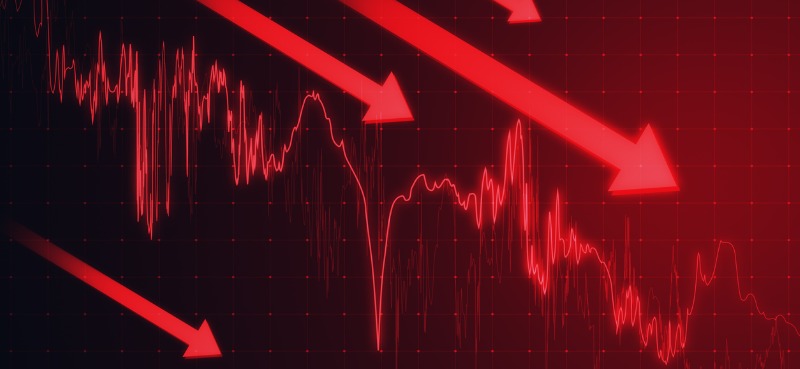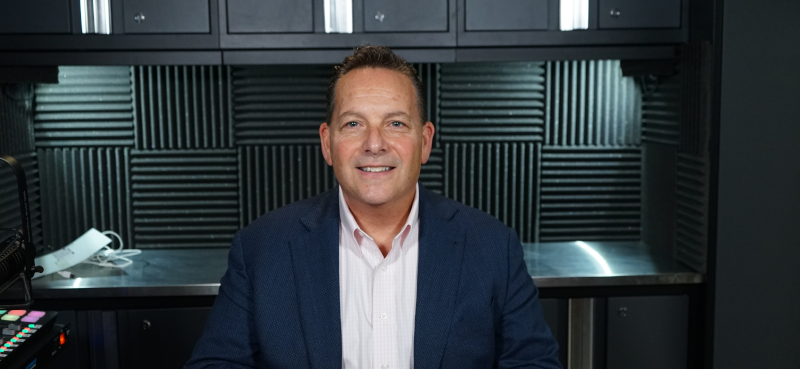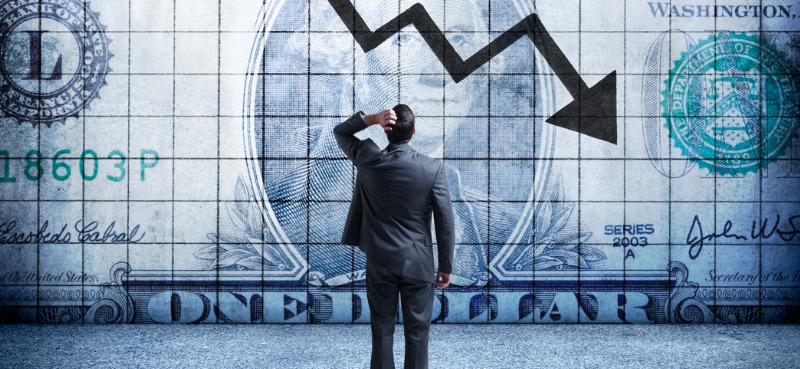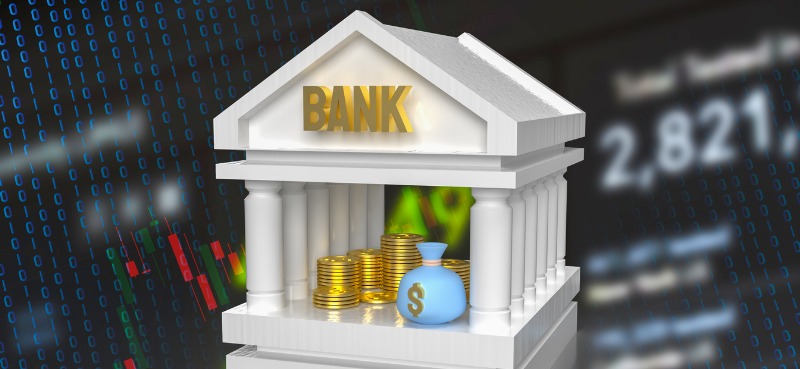Earnings are in for Target (TGT), TJX Companies (TJX), and Lowe’s (LOW). Daniel and I discuss what Target’s dismal results say about the overall economy… why Lowe’s CEO Marvin Ellison is full of s***—and why the stock could drop 20%-plus in the coming months… and why the issues faced by other retailers are great for discount retailers like TJX.
We also break down the major separation taking place in stocks across all sectors… why fundamentals finally matter for the first time in over a decade… what to focus on when looking for great investments… and why one group of hated traders is about to have its heyday.
- What Target’s terrible quarter tells us about the economy [0:30]
- I have a bone to pick with the CEO of Lowe’s [7:10]
- It’s a great environment for discount retailers [15:42]
- Why we’re seeing a separation in stocks across sectors [18:36]
- This group of hated investors knows what it’s talking about [24:55]
Wall Street Unplugged | 972
Retail is hurting—except one group
Announcer: Wall Street Unplugged looks beyond the regular headlines heard on mainstream financial media to bring you unscripted interviews and breaking commentary direct from Wall Street right to you on main street.
Frank Curzio: How’s it going out there? It’s November 16th. I’m Frank Curzio, host of the Wall Street Unplugged Podcast, where I break down the headlines and tell you what’s really moving these markets.
Frank Curzio: It is Daniel Creech Wednesday. Lots of earnings to go over. Lots of stuff. Daniel, let’s start the day, man. How’s it going, because it’s the tale of two companies in the same industry. I talked about this yesterday, but you’re seeing good results in the same industry, and companies reporting bad results within the same industry. Something I talked about, which you’re not used to seeing in the past, but we got to start off I guess with Target. That’s the story today.
Daniel Creech: Yeah, I mean, Walmart blew it out. Last year, they reported good earnings. They beat them this year. Target was the opposite. They earned 3.03 in earnings per share last year. They reported a $1.54 today, down from the consensus of 2.18, Frank. To your point, you’re betting the jockey, not the horse. Management teams are kind of rising to the top there. To go with the macro theme, you and I were talking about this. This makes sense because consumers are getting squeezed by inflation, so they’re looking for value, cheaper. That’s a big tailwind for Walmart versus Target, which is a higher tier, a higher quality, a higher price point. And you said it best, you’re like, “A lot of this is just common sense, man. Things are hard and people are going to go where it’s cheaper in value.” That leads to Walmart over Target, because of their grocery exposure and because consumer behavior’s changing.
Daniel Creech: They said in the last week of the quarter that consumer sentiment can change significantly. That’s to your point. When you have major corporations like FedEx, Target, and all this warning, you got to take note. That just means there’s rougher times ahead in markets and economies in general.
Frank Curzio: It’s going to get worse. I mean, rates are going higher. Like I said, you have this big pile of cash that people have. It’s getting smaller and smaller, and smaller as costs go higher and higher, and higher. And when this delusion that the Fed, they’re going to pivot some. They’re not going to lower rates anytime soon. Even if they stop, even if they slow, even if it goes to four and a half. Four and a half the entire year, next year, you don’t know what that is going to do, and the impact it’s going to have on earnings, and you’re seeing it. But Target compared to Walmart, and you mentioned something good when a lot of times this comes to common sense. Where we can analyze numbers, we can look at everything, but let’s take a step back. Because when you look at the numbers, they are terrible, they missed by 60 cents. Earnings per share down 50% year-over-year, massive.
Frank Curzio: They saw strength in food and beverage, which also is huge, and it makes sense, right? Because groceries are getting much more expensive. So, you’re going to go to Target, you’re going to go to Walmart, but the costs were much, much higher here, which were unexpected. Which, margins got hurt. EBIDTA in, just earnings before interest and taxes, not to get too technical here, but it’s a cleaner version when margins, they’re expecting 3% compared to 6% in margins. If that was earnings, that’s like missing earnings by 70%. When companies miss on margins, you miss. They put in basis points because usually, it’s so small. They don’t say you miss by a percentage, because you usually don’t miss by a percentage. You miss, it’s in basis points. To miss by 3% is insane. Or to say that, that’s what’s going to be going forward, means that they have a lot of inventory, which they do.
Frank Curzio: But they said specifically on the call that in October, sales starting trending lower, got worse in November. And now, they’re warning, like you said, in December. So, what do Walmart do differently? One is that, Walmart caters to a lower end consumer, and Target’s like right in the middle. I always argue like, “Wow, Target’s just weird.” They’re just right in the middle where it’s not, you wouldn’t call it high-end, but it’s like, “Ah, I don’t want to go to Walmart. I’d rather go to Target,” and just like whatever. But their prices are definitely higher. So, what’s happening with Walmart, where people are like, “Okay, I’m going to go buy my groceries there now, because they’re a lot cheaper.” And sometimes they have quality issues, in terms of how they rank them in certain surveys or whatever. But the bottom line is, they’re going there, they’re saving money.
Frank Curzio: And, when you are the cheapest on the street and everybody else is higher than you, what does that do? It gives you pricing power to raise up to those levels, and still probably be cheaper for a lot of these items than Target. And that’s why you’re seeing it. It’s a biggest story here, guys, and I talked about it yesterday. How you’re going to see massive separation in companies within industries, which you’re not used seeing. Usually, the whole sector goes up and some go up a little bit more than others. You’re going to see stocks down 30%, stocks up 30%, and it’s key in this market, because over the next two to three years, what’s your goal? Your goal is to gain market share. Walmart is gaining market share. Who are the companies that are going to gain market share? Because there’s a lot of companies that are going to go under over the next year.
Frank Curzio: A lot of companies are going to see sales go down tremendously. They’re going to cut costs dramatically. Like, Target just announced, they’re cutting costs. You don’t hear that from Walmart. Walmart’s like, “This is what we’re expanding into, because things are really good.” And they have exposure to gasoline and international sales, even shit like… That was actually very good for them. China as well. So, Sam Club membership, different memberships. So, very surprised, these numbers at Target. We’ve had this in our portfolio for a very, very long time and did well with it. This is the third quarter in row, though, Daniel, right? I mean, you lowered significantly two quarters in a row. This is the third quarter, you thought a lot of this was priced in. It’s not priced in, but it goes to show you how you have to be very, very careful of what company you’re investing in.
Frank Curzio: And it’s not just about, oh, the markets are going to go up 20% or down 20%. It’s companies that are going up 20%. Look at what Walmart did yesterday, look what Target did yesterday, right? These are comparable. These are two companies that you mention in the same breath when you’re talking about the industry. Lowe’s and Home Depot as well. Home Depot, I thought was a lot better. Lowe’s are doing okay today, and we could turn to that with Lowe’s. But you’re seeing that separation here, and Target’s pretty bad. And again, they have a good balance sheet, they’re going to be fine. I think a lot of this is priced in, but when you see Walmart’s quarter, it just makes you want to run to Walmart, even in a much more expensive valuation.
Daniel Creech: Yeah, I mean, it hurts. It’s down 15%. If you’re a long-term holder in Target, it’s basically trading back to the lows, where it was in May or June where it warned, like you said, a couple of quarters ago. It’s frustrating. It’s a black eye. But I mean, I don’t think anybody’s really worried about Target over the longer term. I think, Target’s one of those organizations where if management doesn’t figure it out, they’ll replace him, I think. I’m not saying his job’s at risk or anything of that nature, I’m just, this is tough. They got to weed through all that. They definitely need to follow in the footsteps and get it, execution more quickly than Walmart.
Daniel Creech: Lowe’s, I thought, we’ve talked about this several times. We know that there’s a lot of headwinds and things ahead for the economy, the markets in general. But that doesn’t mean that all news is going to be negative. So, you got some decent data out today on retail sales, but Lowe’s comes out, if you read through Lowe’s conference call and talking points, you don’t think a recession’s coming. He’s not seeing consumers slowdown. He’s seeing strong demand still. He’s seeing lumber prices and things come down. That’s all very, very positive, if you just take that by itself. You can’t do that. But I’m just saying, you’re going to always see pockets where it’s like, “Hey, this is fantastic. Look, these guys are booming.” We talked about Eaton Corporation, talking about how-
Frank Curzio: The difference is, and I’m glad you brought that up. What did Eaton’s CEO say in the call? What did Eaton’s CEO say on the call, even though they reported record earnings? What did they say in this call?
Daniel Creech: Well, they think that a recession is coming. Yes.
Frank Curzio: Okay, here’s what Ellison said in the call, and this is a guy that left JC Penney for dead, and lied to get-
Daniel Creech: I knew that, I knew you couldn’t hold back.
Frank Curzio: I’m going to be pissed off here, because that was a stock that I believed in and believed in him. And not only did he just bankrupt the company, but he left and then he just went to Lowe’s. And I don’t think he’s a good manager at all, but he’s doing the same shit here, because any company that’s reporting pretty good earnings in this market and saying that they’re not seeing a slowdown in customer traffic, and they’re not expecting it, means they’re not preparing and that he’s out of his mind. That’s the biggest red flag out there. If companies are reporting right now, Eaton reported record earnings. I’ve seen a lot of companies report record earnings say, “Look, yes, we’re worried about the customer going forward.”
Frank Curzio: Even Walmart’s CFO went on an interview on CNBC and said the same thing. He said, “Listen, we’re definitely seeing deteriorating trends. People are spending less, we’re managing through this. We have pricing power here.” And they do. And that’s why they beat the quarter. And the numbers from Walmart, it wasn’t that they’re selling more stuff, unit sales are down. It’s that they’re selling at a higher price, and they have pricing power, and they’re taking market share, again from Target.
Frank Curzio: Well, Lowe’s came out. You have to be careful because everyone’s saying this, and this is the story in the home builders and the home industry, where you’re not going to see prices come down too much because there’s not enough supply in the market. However, orders are being canceled like crazy. And because of that, Lowe’s thinks that, “Hey, our do it yourself sector,” which is 75% of their business, it’s only 50% of Lowe’s. So, 25% is professional, which are pretty much contracts that are going out, and they have to fulfill all the promises and the bills that they have over the next couple years. And then you’re going to see a big slowdown.
Frank Curzio: But there’s a big difference to me, between Home Depot and Lowe’s. I thought Home Depot is having more professional their business, where Lowe’s is more tied to the individual consumer, right? 75% do it yourself. And he is like, “Well, a lot of people can’t afford houses. They’re going to fix up their house.” Wrong, wrong, wrong, wrong, wrong, wrong. You do not know your consumers. You do not know what’s going on out there, because people are struggling. You’re seeing credit card, the average credit card, percentage on a credit card is 19%, highest since 1980, we’re seeing more household debt. Record debt right now. This just came out yesterday from the New York Fed. People are struggling, they’re cutting back tremendously, and as home prices are coming down, it might not make sense to actually fix up your home and put money into it, because you might not see that value. Especially, with home prices expected to come down because mortgage rates are so high.
Frank Curzio: So, when I look at an industry that is going to be horrible next year, it was horrible as soon as rates went above four and a half percent, and they’re still at 6.8, everyone’s happy because they came down a ton from 7.2 to 6.8. No one was buying a house at four and a half and higher, even five. It’s not going to that level anytime soon, because the Fed’s not lowering rates. So, when I see a CEO go on, and we saw that from Ford and I wrecked them, I saw it from Chapek with Disney and I wrecked them. Says, “Things are great, things are great.” No they’re not, not based on your numbers when you look under, they’re not great. Okay?
Frank Curzio: It’s okay to say, “Hey, you know what? We’re struggling here. We’re not selling EVs, we’re losing money on every EV sale.” Wouldn’t that be nice if Ford actually said that? They won’t say that, and a lot of these companies. But when it’s the optimism right now, you have the chance that 80% or 90% of the surveys out there, I think there was an Eversource survey and ton of them, believe we’re going to be in a recession next year. So, you could taper expectations. For Ellison to come on Lowe’s and say, “Things? We’re fine. We’re not seeing a slowdown.” We heard that from Target nine months ago and Walmart, and both of them fell by its largest one day percentages since the ’87 market crash. You have to be very, very careful here because it’s falling off a cliff. It’s happening quick, based on the pace of rate hikes. We’ve never seen rate hikes this fast in the Fed era, history of Fed era, and they’re going to result in the first sector that gets hit.
Frank Curzio: Obviously, the most interest rate sensitive is housing. Now look at the autos, now look at the semis getting nailed. Yeah, you’ve seen a little bit of a bid here and money, seasonal money coming in and buybacks are opened up, stuff like that. But I would be very, very careful, because now the expectations are higher than they’ve ever been, which you don’t want to see heading into next year, which is going to be horrible. And recession, higher rates and everything, demand falling off a cliff. The Fed’s still removing liquidity from the market through quantitated tightening, which nobody’s really talking about, that you’re just looking at rates that’s massive. You’re taking money out of the system, the trillions and trillions that you put in the system the past two years. I mean, if Lowe’s misses or warns, this is the stock’s that going to get hit by 20, 30%. And I think over the next two quarters, you’re going to see that.
Frank Curzio: That’s why I like long dated puts, because it might go up for the next two weeks, it might be better than everybody else. But if you really think that they’re going to generate this type of earnings, and I see this with a lot of companies. I have, Walmart is trading at, what is it, 24 times forward earnings? But yet, those numbers were really good. Lowe’s, I don’t know. To tell me that you’re going to see demand in this sector next year and you’re not seeing a slowdown, I mean, people are cutting back. You’re seeing it across the board. I’d be very careful. And that’s why I love earnings season. You really dig in and seeing, I could be wrong on this, this. I’ve been wrong before, but just to me, I think you’re going to see a big separation between Home Depot and Lowe’s, just like you’re seeing with Target and Walmart.
Frank Curzio: And, I think you’re going to see that over the next six months, and you got a real good opportunity to buy puts on this. It’s not hard. Buy nine month, year puts, and you think they’re going to really meet earnings? You think this is a company that could fall because we’re seeing it even today. I mean, Micron’s down a ton. You’re seeing Advanced Auto parts down a ton. I mean, these companies, when they report earnings, they’re lowering expectations. Earnings estimates are way too high. It’s giving you an opportunity where, I don’t know what the market’s going to do and I don’t know how the big companies are going to do, but I know is individual names and even industry leaders on the top three or four of those companies, where one or two of them and not getting it done. It could see a significant pullback here. And that’s what I’m seeing here. So for Lowe’s, I wasn’t too crazy about, but we can move on to TJX. I don’t know if you have any more comments on Lowe’s, but TJX was pretty solid.
Daniel Creech: Yeah, I mean, they’re definitely… I mean, no. Lowe’s, I could play devil’s advocate, but it’s just going to get you fired up. It did shock me, like I said, how positive he sounded. It definitely stood out.
Frank Curzio: Oh, they reported a good quarter. They reported a good quarter, I just, he’s very, very positive.
Daniel Creech: Yeah. Well, some of the things, he said the average US home has roughly 330,000 of equity and is 40 years old. He said people incorrectly thought millennials wouldn’t own homes and be permanent renters. The opposite is actually occurring. And he says he’s positive about future trends in 2023. So, we’ll mark this on our calendars. Like I said, it’s just, it’s one of those standouts and time will tell. But yeah, he’s very optimistic.
Frank Curzio: Have you owned a house?
Daniel Creech: What’s that?
Frank Curzio: Have you ever owned a house?
Daniel Creech: No.
Frank Curzio: Okay. So, 330,000 equity in your home is meaningless, because you can’t get it out. You really can’t get it out. I mean, how do you get it out? You used to refinance, you can’t refinance now. But you know how they’re getting it out is HELOCs, because I had a really good guy who works within the industry, I won’t tell you the company he works in, and he was like, “Frank, I’m not seeing this at all,” whatever. And emailed me. And I took the question on Frankly Speaking, which is only for paid subscribers, where you all guys get to write in, and I have a Q&A every Friday. Goes directly to all those. All you have to do is own one product and you get it here. But that’s Frankly Speaking. But he had a really good point. He’s like, we’re not seeing HELOCs at all. Numbers just came out showing from the Fed, that HELOCs again, had a huge, huge quarter, which is home equity lines of credit.
Frank Curzio: They’re trying to take their equity out of their homes, because everything’s going higher, and they’re seeing their costs go higher tremendously, with interest rates going higher, and their costs, everything. And they’re not generating as much revenue, and the possibility of them getting laid off, some of these people. But when I see that equity and getting it out, you could sell your house, but it’s not as easy to sell your house where that market is coming down. You could sell it, but you’re not going to sell it for the price it was six months ago, definitely. Not even in Florida you will.
Frank Curzio: So, how do you get the equity out of your house? And that’s the thing, because that’s what they’re looking at going, “Wow, I have all this equity.” You could sell it, but that’s different. You can have extra money, but you still have to buy another house. So, it’s going to be interesting to see how they tap that equity and how they get it out, because it’s not as easy, and you’re going to pay a much, much, much higher rate to take that out of your house right now. And I don’t know. I don’t know if that’s the best thing, and we’ll see, but-
Daniel Creech: Yeah, that just surprised me. Like I said, his optimism is a standout, that’s for sure.
Frank Curzio: Yeah. And I just don’t like optimism when you don’t have to be optimistic. You just say, “Hey, we’re seeing it pretty good and it’s okay.” Not like, “Hey, no, nothing at all. Nothing at all.” And I know his history, and yes, it’s personal for me because I think the guy is really, I won’t even go into the word I was going to use, but yeah. I don’t like him as a manager, and that guy has always been optimistic, when things aren’t optimistic, and I hate that. He reminds me of Ford, or reminds me of Chapek with Disney. Just tell the truth and tell you how things are going bad, because those guys just painted this picture like, “Everything’s great, the future’s great, we’re awesome.” And they had a massive multiple and fooled a lot of people, and both those stocks have gotten hammered.
Daniel Creech: What’s the term? Carnival barker?
Frank Curzio: Basically. Yeah, basically. So TJX, I looked at. TJX is also a portfolio holding and recently recommended, doing good. One of the only companies I think you’re going to see, maybe I’d like to see Burlington, because I don’t shop at Burlington often. I just went there, my wife wanted to go there, and I must have bought, this is probably about a few months ago, I think we just going away for a couple days and we said, “Hey let’s go to Burlington.” We both really wanted to go to Burlington, and I wound up buying I think 12 pieces of clothing, and I must have paid maybe a hundred dollars for it or less than that. And these are all big brand names. I was like holy shit. And that’s TJX, as well. So, you’ve seen these inventory where apparel isn’t really doing well in a lot of segments for some reason. They have to get rid of their inventory.
Frank Curzio: We all know Walmart did a great job getting rid of its inventory, high inventory in apparel, because that market’s really, really coming down and has high inventory. And that inventory goes to TJMaxx, which said that their margins went a lot higher this quarter because they’re probably getting it. Fire sell prices, they got to get rid of this inventory, and then they’re able to sell it at a decent price and still make a profit on it. I mean, you’re getting brand name shirts that could be 30, $40 for $15 and $20, and if you’re getting them for eight or seven, or whatever they get them for. I’m just putting it in perspective. But TJX was good, which is when I looked at those numbers, sales missed, but earnings were higher. Their margins were good, which shows pricing power. You need to see that with these companies, because unit sales are going to be down. People aren’t buying as much as they’re buying, but they’re making it up on pricing. And not everyone has pricing power.
Frank Curzio: Walmart has it. TJX has it. Again, one of the few companies that said apparel was doing good, great balance sheet, 3.4 billion in cash. They’re going to spend around two and a half billion on buybacks over the next three to six months. That’s about 4% of its market cap. So, if you want exposure to retail, I think TJX is great, Walmart’s a little bit more expensive, but those numbers are there. And Walmart may not be as expensive if they continue to drive those earnings higher because not only do they have pricing power, they’re taking market share clearly from Target and from everybody else. And let’s see, even from grocery stores, especially where people are seeing massive increases in the price of food, and they’re starting to go to Walmart and even Target, which said that grocery sales were good as well, right? Food and beverage. But what was the percentage you said between Target and Walmart really quick, in terms of how much is grocery related?
Daniel Creech: Target had about, this is just the last quarter of the 10K. Groceries, food and beverage were about 20 and a half percent for Target. And they were about 58% for Walmart. That’s under the grocery category. And that was in US net category sales for Walmart.
Frank Curzio: So, that’s total sales, 60% of total sales for Walmart?
Daniel Creech: In the US. Yeah. So, I mean, I took, it wasn’t the 150 in revenue, it was like 105 and change, but they broke that down. But I was just showing you how much. That was just in the US.
Frank Curzio: Wow, that’s incredible. Wow. That’s awesome. Yeah, it’s good when you have that much leverage in that category, and that category’s really kicking ass, right?
Daniel Creech: Well when you’re doing 150 billion in a quarter, you got some.
Frank Curzio: No, absolutely. Absolutely. But, Daniel, I want to bring this up again because yesterday, I had this whole podcast where I try and explain it, where I’m not contradicting myself, where I’m not too sure where the market’s going to go. But I’m seeing companies within specific industries that are going to get it done, and not going to get it done. And it was funny, because we mentioned Walmart, and now we see Target.
Frank Curzio: We mentioned Norwegian Cruise Lines, how all their debt is fixed, they don’t have any debt payments, they focused on a higher end consumer. And what happened last night, which you’re seeing in Carnival down tremendously today, down at 12, 15%. They needed to raise money, another billion in financing. And that was one of the ones, and they focused on a lower end consumer, which are really having trouble. And you’re seeing across credit card trends, you’re seeing it from the Walmarts, you’re seeing everybody warned about that, saying that they’re definitely cutting back on spending and that they’re seeing just high gasoline prices, high price across the board, it’s hurting them. That’s Carnival’s bread and butter. That’s where they get the most revenue from.
Frank Curzio: So, last quarter was weak, which I reported about five weeks ago. They showed that costs were up significantly, while they didn’t have much pricing power to pass on those costs to the lower end consumers. But in that quarter, analysts were not expecting the company to need more capital, at least from the tone for management. They said it’s a little weak. So, this was a surprise. $1 billion raise at 5.75, convertible senior note, due 2027. It’s just when you’re under the impression that the company doesn’t have to raise money, and I’ve been through this even with mining stocks and whatever, when they’re like, “No, no, we have enough capital.” And all of a sudden, they do some kind of deal, and they raise money like two months later, and you’re like, “You just told me didn’t need capital.”
Frank Curzio: So, if you didn’t need capital, “Well, it’s good money, and this,” and then you’ll bring in some guys who basically are going to blow out of your stock, that don’t give a shit about your long-term value of the stock once that lockup period ends, and they’re raising money just for the fees. And you have to be really careful here because, this billion again, bonds are better than stocks. That rate doesn’t seem too crazy. 5.75 convertible, senior note due 2027. But it does hurt credibility when you don’t think you have to raise money and companies come out. You don’t have to worry about it in Norwegian, they don’t have any money due. They have fixed line of credits, they restructured that. All this during COVID. Now all the boats are in the water. They focus on higher end consumers. It’s much cheaper to go on these cruises, even on the higher ends for Norwegian, than it is to go to Disney World and take your family here for trips.
Frank Curzio: And I think again, you’re going to see separation. You saw it also today, Daniel, with Micron warning again. Huge inventory concerns while, and I don’t know if it’s an apples to apples comparison, you could say they’re both in the same industry. But Taiwan Semi more money coming into it. These guys have, I mean, their margins are incredibly high. They’re one of the few, I think Samsung, and I don’t know if Intel still has the fabs and makes chips… They do. But again, we’re looking get out of this business, back into this business, do the Biden plan. But Micron warning again, but Taiwan Semi is in a much, much better place where they have higher margins and have pricing power, because they’re the biggest and the best. And they’re probably still close to full capacity as their clients. They have all the biggest clients, including Apple. They’re just light years above everybody else. So, there’s going to be separation in semiconductor companies as well.
Frank Curzio: But you’re seeing it. You’re seeing it. You’re going to continue to see it. That’s why I love, keep pushing down your throat, buying puts is a strategy, because there’s a lot of companies I’m seeing that are definitely not going to meet. Earnings estimates are way too fucking high, guys. They’re way, way too hot. Nobody has this right? It’s going to be 180, it’s going to be 180 and the lowest on the street right now, the base case for Morgan Stanley is 195. The base case for Goldman’s is 200. Right now, they’re sitting at $237 for next year’s earnings. They’re going to be 180 next year, which means that a lot of companies are going to do exactly what Target did today. They’re going to warn and lower guidance significantly, which is not priced in. And if you get a 14, 15% decline in the stock, in a day, you’re going to make a fortune on these things.
Frank Curzio: And if not, it’s okay because there’s a lot of companies that you’re long, that are probably hold up well. And, I think Home Depot, you look at Walmart as well, there’s companies that are getting it done. Apple looks pretty good right now, right? Definitely separation from the rest of the FAANGs. But let’s see what happens. Let’s see what happens. But that’s a big theme here. I mean, it’s not all companies within this sector. You can’t bet on sectors here. You have to bet on individual names, because management teams and fundamentals, guys, are going to matter significantly over the next two to three years. They didn’t matter over the past 12. It didn’t matter if your stock was traded 150 times forward earnings, as long as they were growing, growing, growing. That’s all anyone cared about. You got clients coming in, it’s all, it’s why Disney, people bought Disney, Daniel, like crazy because they’re subscribers, massive subscribers.
Frank Curzio: No one cared that they weren’t making any money off those subscribers. Now it matters, because now, you’re going to have to cut costs significantly, while other companies like Walmart are looking to expand and build on their momentum, and they’re going to be taking market share. And that’s going to be a big theme, guys, going forward, over the next two years, especially over the next two quarters.
Daniel Creech: Well said. I like that, Frank.
Frank Curzio: For me, I love this type of market where you have to dig into earnings, you have to dig into those fundamentals. You have to see what’s going on, what segments are doing well. It’s extremely important, because there’s two major themes here, Daniel, that you got to focus on. And it’s pricing power, companies that have pricing power. You have Walmart that has it, and you have Target that doesn’t. You see, Norwegian has it. You’ve seen Carnival doesn’t. And companies that are gaining market share, because those companies are going to do fantastic. And if you have your own businesses, and listen up, guys, because this is what you want to do in these markets, where you’re providing a great service for your clients. How do you take market share? Yes, you’re going to have to raise prices to cover your input costs, but not to the point where you’re just screwing everyone, and you’re raising them so much more.
Frank Curzio: But yes, it’s going to be a slowdown going into next year, but there’s going to be a lot of players that aren’t going to survive and they’re going to lose a ton of business from doing the wrong thing or whatever. And it’s your opportunity because we know later on, the S&P 500 is going to go up a lot, right? It’s going to go up a lot. Long-term, three, four, you look at charts, is the fifties. It goes up and up and up. So, it’s just a period right here of maybe 24, 36 months. It’s going to be really, really ugly, I think, as long as rates are high and management teams, like I said, are going to matter. If they see you have your own business, and you’re going to do well with that, you have to focus on your customers right now. You have to keep those price low, you got to worry about those cuts.
Frank Curzio: But this is a time to take market share. Because if you have pricing power and you can take market share, and treat your customers good, that’s huge. Because that’s what Walmart is doing. That’s what Walmart doing with Target. They’re taking that market share away. They’re taking away from grocery stores through food and stuff like that. And when I look at this market, who are the people that we made fun of all the time, Daniel? You look at Einhorn, you’ll look at Chinos, right? All these people that you made fun of, Carson Block, these are guys who are forensic-
Daniel Creech: Citron. The one guy retired during the meme stock rallies and stuff. Not retired completely, but he said, “Hey, we’re not short, and we’re not going to be public about this anymore.” Remember when he tweeted that a while ago?
Frank Curzio: Yeah, yeah. Yeah. That’s true. That’s true.
Daniel Creech: But to your point, great, amazing analysts as a group.
Frank Curzio: These are guys that people were making fun of, because it didn’t matter. Didn’t matter what, it didn’t matter. I think, he was showing Shopify or whatever and got wrecked on it. But it didn’t matter as long as you were growing. Just like Disney, as long as you’re growing those numbers, nobody cared how much you made on those numbers, on those subscribers, right? Just grow that number. A hundred million, 150 million, and your stock went higher. And that’s true for social media companies as well. And all these unicorns, right? Just, “Hey, look how much, we have a million users, we have five million users, 10 million.” “How much you’re making?” “Doesn’t matter. We just keep growing that user base,” right? Now it matters. Fundamentals matter. You need a good balance sheet. You’re going to see cost cutting, management teams matter. This is what you have to focus on, because when I look at a company like Lowe’s, and a CEO like that gets on and tells you how great everything is, we saw how it could switch on a dime.
Frank Curzio: We see it. We see it through this whole entire period. Holy cow, you just said it was great, and now it’s not great. Where again, the Walmarts and the Targets fell by the largest one day amounts since the ’87 crash. And you’re seeing some of these companies fall by 20%. Even the Googles, even the Metas, right? So, I would bet that Lowe’s, with the optimism there, and these guys expecting everything to be okay with do it yourself market, and consumers are going to suddenly have money to spend, they’re trading at a pretty high multiple. I’d be careful there. I would bet that they’re going to see, all you need is a little bit of a hiccup from those guys, because optimism’s now built in. The stocks going higher, and over the next two quarters, three quarters where the housing market is, do you think those numbers are going to be record? Because, that’s what they’re reporting. Record numbers.
Frank Curzio: You think they’re going to be record numbers next year, where the housing market is? I don’t. And if they miss, you’re going to see a 20% plus decline and that results in a hundred to 300% gain, depending on the put that you’re buying over a whole year. But that’s what you’re betting on. You don’t care about these markets and a 6% move in NASDAQ here and there, and you’re going to see those during bear markets. But, earnings are going to come down significantly. Significantly. And you’re going to see that. And that’s the danger, and that’s what I’d be worried about. So, any final thoughts, Daniel?
Daniel Creech: I do like the conversation we’ve had about short sellers. We need to get a couple on the podcast. Those would be good interviews. And just because, I think you’re right. That they’ve been made fun of and this is going to be a perfect environment. So, it’s going to pay to pay attention to it.
Frank Curzio: No, absolutely. Okay guys, so look, that’s it for me. Daniel, thank you so much. Questions, comments, I’m sure we get a lot these days, frank@curzioresearch.com. Daniel, what’s your email?
Daniel Creech: daniel@curzioresearch.com.
Frank Curzio: All right guys, take care, and I’ll see you tomorrow.
Announcer: Wall Street Unplugged is produced by Curzio Research, one of the most respected financial media companies in the industry. The information presented on Wall Street Unplugged is the opinion of its host and guests. You should not base your investment decisions solely on this broadcast. Remember, it’s your money and your responsibility.
P.S. Curzio Research Advisory is up nearly 20% on TJX in just a few months…
And the portfolio is full of my favorite stocks for this wild market.
I just recommended 2 new stocks to avoid a painful 2023—and rake in profits.























